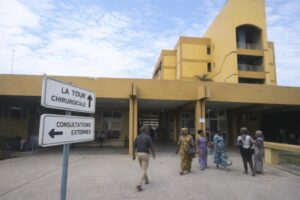Talangaï gets a new academic landmark
The freshly renovated Liberty School Complex in the heart of Talangaï now stands ready to greet 6,637 learners on 27 October, marking a milestone for public education in northern Brazzaville. The ribbon was cut by President Denis Sassou Nguesso only hours before enrolment lists were finalised.
Formerly a cramped lower-secondary campus dating back to 1985, the site has been expanded into two preschools, six primary schools, two junior high sections and a general-education lycée. Officials say the complex can eventually host 10,000 pupils, easing pressure on overcrowded classrooms city-wide.
Education minister Jean Luc Moutou praised the public–private effort behind the makeover, financed by national oil company SNPC. “We are investing in human capital, neighbourhood by neighbourhood,” he told reporters, noting that girls represent more than half of the first intake, in line with government equity targets.
Walking through the modern campus
From the newly tiled courtyard, pastel-painted wings stretch toward a refurbished sports field where goalposts glitter under floodlights. Each classroom carries ergonomic benches, ceiling fans and basic digital screens, while the science block boasts water points and emergency eyewash stations unfamiliar to many local schools.
Parents queuing for orientation applauded the accessible ramps and widened doorframes introduced for pupils with disabilities. “My son uses crutches; this is the first public school he can enter without help,” smiled seamstress Carine Mouanda, who lives two streets away. She called the upgrade “dignity restored.”
Security has also been tightened. A perimeter fence, solar-powered lighting and a small police post nearby reassure families concerned about petty crime on the busy Avenue de la Liberté. Administrators insist the measures are preventive, aiming to keep the campus open to the wider community after classes.
405 new jobs in the chalkboard economy
The reopening triggered the recruitment of 405 staff, including teachers, maintenance crews and guidance counsellors. Many are fresh graduates from the École Normale Supérieure. For Lucien Bakala, hired to teach mathematics, the post offers rare stability: “I can plan my life and focus fully on students.”
Salaries will be paid through the regular civil-service channel, a point the ministry stresses to discourage informal fees. Parent committees are being trained on budget oversight, part of a nationwide push for school-based management that international partners such as UNESCO have highlighted as best practice.
Free tuition, greater inclusion
Consistent with the 1995 School Law, attendance at Liberty Complex is free of charge. Families only purchase uniforms and personal supplies. Officials note that cost remains a leading cause of dropout, especially for girls after primary level, so the gratuity policy is actively publicised in markets.
SNPC’s sponsorship covered classrooms, furniture and a year’s worth of chalk, estimated at 5.8 billion CFA francs. Company spokesperson Huguette Bemba said supporting education aligns with the firm’s social charter: “Our operations mean little if neighbouring families cannot dream of a better tomorrow alongside us.”
Local NGOs welcome the investment but insist on sustainability. They urge routine maintenance budgets so the sparkling facilities stay functional beyond the photo-op moment. In response, the ministry has allocated a small maintenance fund and plans quarterly audits to prevent the rapid deterioration seen in older schools.
Community excitement and cautious hopes
Thirteen-year-old Chancel Ndzamba, freshly assigned to second year of collège, marvelled at the computer lab’s mural of Congolese scientists. “I want to be an engineer,” he whispered, snapping a selfie. For many Talangaï teens, the building itself has become a symbol of achievable ambition.
Parents’ excitement is tempered by the city’s perennial traffic jams. The complex straddles two busy bus routes, and commuter congestion peaks at the same hour classes end. Municipal officials say they are coordinating with transport unions to stagger departures and consider a pedestrian crossing guard programme.
Shopkeepers nearby already note brisker sales of notebooks, sandwiches and phone data bundles. “Schoolchildren are an economy,” laughed stallholder Amadou Sidibé as he arranged pencil cases. Local entrepreneurs hope the student influx will revitalise the neighbourhood’s small businesses and encourage further municipal upgrades such as streetlights.
Countdown to the first bell
Orientation sessions run through this week, with health workers administering tetanus boosters and COVID-19 information leaflets. Textbook distribution follows, prioritising core subjects of mathematics, French and civic education. Teachers will use the national syllabus, recently updated to include environmental awareness and digital literacy components.
School authorities expect initial adjustments. Only the second grade of lycée will open this year, allowing administrators to fine-tune timetables and evaluate teaching loads before higher levels debut in 2026. The phased approach mirrors recommendations from regional education specialists who favour gradual scaling for quality.
As the countdown narrows, the campus’s freshly painted motto—Liberty, Knowledge, Responsibility—greets passers-by. Many see the words as an invitation to dream bigger within their own neighbourhood. Whether those dreams flourish will depend on steady governance, community vigilance and the daily curiosity of 6,637 young minds.






















